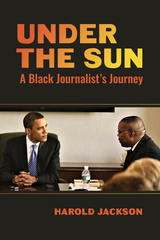5 books about Newton, Esther
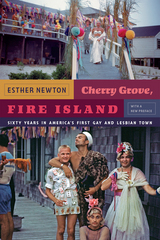
Cherry Grove, Fire Island
Sixty Years in America's First Gay and Lesbian Town
Esther Newton
Duke University Press, 2014
First published in 1993, the award-winning Cherry Grove, Fire Island tells the story of the extraordinary gay and lesbian resort community near New York City. This new paperback edition includes a new preface by the author.
[more]
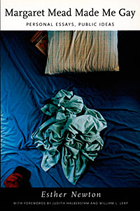
Margaret Mead Made Me Gay
Personal Essays, Public Ideas
Esther Newton
Duke University Press, 2000
Margaret Mead Made Me Gay is the intellectual autobiography of cultural anthropologist Esther Newton, a pioneer in gay and lesbian studies. Chronicling the development of her ideas from the excitement of early feminism in the 1960s to friendly critiques of queer theory in the 1990s, this collection covers a range of topics such as why we need more precise sexual vocabularies, why there have been fewer women doing drag than men, and how academia can make itself more hospitable to queers. It brings together such classics as “The Mythic Mannish Lesbian” and “Dick(less) Tracy and the Homecoming Queen” with entirely new work such as “Theater: Gay Anti-Church.”
Newton’s provocative essays detail a queer academic career while offering a behind-the-scenes view of academic homophobia. In four sections that correspond to major periods and interests in her life—”Drag and Camp,” “Lesbian-Feminism,” “Butch,” and “Queer Anthropology”—the volume reflects her successful struggle to create a body of work that uses cultural anthropology to better understand gender oppression, early feminism, theatricality and performance, and the sexual and erotic dimensions of fieldwork. Combining personal, theoretical, and ethnographic perspectives, Margaret Mead Made Me Gay also includes photographs from Newton’s personal and professional life.
With wise and revealing discussions of the complex relations between experience and philosophy, the personal and the political, and identities and practices, Margaret Mead Made Me Gay is important for anyone interested in the birth and growth of gay and lesbian studies.
Newton’s provocative essays detail a queer academic career while offering a behind-the-scenes view of academic homophobia. In four sections that correspond to major periods and interests in her life—”Drag and Camp,” “Lesbian-Feminism,” “Butch,” and “Queer Anthropology”—the volume reflects her successful struggle to create a body of work that uses cultural anthropology to better understand gender oppression, early feminism, theatricality and performance, and the sexual and erotic dimensions of fieldwork. Combining personal, theoretical, and ethnographic perspectives, Margaret Mead Made Me Gay also includes photographs from Newton’s personal and professional life.
With wise and revealing discussions of the complex relations between experience and philosophy, the personal and the political, and identities and practices, Margaret Mead Made Me Gay is important for anyone interested in the birth and growth of gay and lesbian studies.
[more]
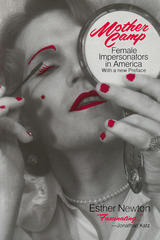
Mother Camp
Female Impersonators in America
Esther Newton
University of Chicago Press, 1979
For two years Ester Newton did field research in the world of drag queens—homosexual men who make a living impersonating women. Newton spent time in the noisy bars, the chaotic dressing rooms, and the cheap apartments and hotels that make up the lives of drag queens, interviewing informants whose trust she had earned and compiling a lively, first-hand ethnographic account of the culture of female impersonators. Mother Camp explores the distinctions that drag queens make among themselves as performers, the various kinds of night clubs and acts they depend on for a living, and the social organization of their work. A major part of the book deals with the symbolic geography of male and female styles, as enacted in the homosexual concept of "drag" (sex role transformation) and "camp," an important humor system cultivated by the drag queens themselves.
"Newton's fascinating book shows how study of the extraordinary can brilliantly illuminate the ordinary—that social-sexual division of personality, appearance, and activity we usually take for granted."—Jonathan Katz, author of Gay American History
"A trenchant statement of the social force and arbitrary nature of gender roles."—Martin S. Weinberg, Contemporary Sociology
"Newton's fascinating book shows how study of the extraordinary can brilliantly illuminate the ordinary—that social-sexual division of personality, appearance, and activity we usually take for granted."—Jonathan Katz, author of Gay American History
"A trenchant statement of the social force and arbitrary nature of gender roles."—Martin S. Weinberg, Contemporary Sociology
[more]
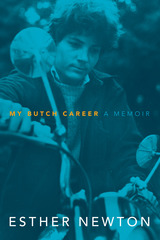
My Butch Career
A Memoir
Esther Newton
Duke University Press, 2018
In My Butch Career Esther Newton tells the compelling, disarming, and at times sexy story of her struggle to write, teach, and find love, all while coming to terms with her identity. Newton recounts a series of traumas and conflicts, from being molested as a child to her failed attempts to live a “normal,” straight life in high school and college. She discusses being denied tenure at Queens College and nearly again so at SUNY Purchase. With humor and grace, she describes her introduction to middle-class gay life and her love affairs. By age forty, where Newton's narrative ends, she began to achieve personal and scholarly stability in the company of the first politicized generation of out lesbian and gay scholars with whom she helped create gender and sexuality studies. Affecting and immediate, My Butch Career is a story of a gender outlaw in the making, an invaluable account of a beloved and influential figure in LGBT history, and a powerful reminder of only how recently it has been possible to be an openly queer academic.
[more]

Out in the Field
Reflections of Lesbian and Gay Anthropologists
Edited by Ellen Lewin and William L. Leap
University of Illinois Press, 1996
"Definitive and well-rounded. . . . Explores how anthropologists
manage issues of identity and sexuality in field research and professional
life. In an era when the field worker's positionality is critical to research
and ethnographic writing, this insightful book has much to say to gay
and straight researchers alike." -- Louise Lamphere, University of
New Mexico
"Addresses sensitive, controversial, and tabooed subjects. . . .
Out in the Field will be read by a variety of audiences, within
and outside of anthropology." -- Jean Jackson, Massachusetts Institute
of Technology
Lesbian and gay anthropologists write candidly in Out in the Field
about their research and personal experiences in conducting fieldwork,
about the ethical and intellectual dilemmas they face in writing about
lesbian or gay populations, and about the impact on their careers of doing
lesbian/gay research.
The first volume in which lesbian and gay anthropologists discuss personal
experiences, Out in the Field offers compelling illustrations of
professional lives both closeted and out to colleagues and fieldwork informants.
It also concerns aligning career goals with personal sexual preferences
and speaks directly to issues of representation and authority currently
being explored throughout the social sciences.
CONTRIBUTORS: Geoffrey Burkhart, Liz Goodman, Delores M. Walters, Walter
L. Williams, Sabine Lang, Ellen Lewin, William L. Leap, Ralph Bolton,
Elizabeth Lapovsky Kennedy, Madeline Davis, Will Roscoe, Esther Newton,
Stephen O. Murray, James Wafer, Kath Weston, Sue-Ellen Jacobs
manage issues of identity and sexuality in field research and professional
life. In an era when the field worker's positionality is critical to research
and ethnographic writing, this insightful book has much to say to gay
and straight researchers alike." -- Louise Lamphere, University of
New Mexico
"Addresses sensitive, controversial, and tabooed subjects. . . .
Out in the Field will be read by a variety of audiences, within
and outside of anthropology." -- Jean Jackson, Massachusetts Institute
of Technology
Lesbian and gay anthropologists write candidly in Out in the Field
about their research and personal experiences in conducting fieldwork,
about the ethical and intellectual dilemmas they face in writing about
lesbian or gay populations, and about the impact on their careers of doing
lesbian/gay research.
The first volume in which lesbian and gay anthropologists discuss personal
experiences, Out in the Field offers compelling illustrations of
professional lives both closeted and out to colleagues and fieldwork informants.
It also concerns aligning career goals with personal sexual preferences
and speaks directly to issues of representation and authority currently
being explored throughout the social sciences.
CONTRIBUTORS: Geoffrey Burkhart, Liz Goodman, Delores M. Walters, Walter
L. Williams, Sabine Lang, Ellen Lewin, William L. Leap, Ralph Bolton,
Elizabeth Lapovsky Kennedy, Madeline Davis, Will Roscoe, Esther Newton,
Stephen O. Murray, James Wafer, Kath Weston, Sue-Ellen Jacobs
[more]
READERS
Browse our collection.
PUBLISHERS
See BiblioVault's publisher services.
STUDENT SERVICES
Files for college accessibility offices.
UChicago Accessibility Resources
home | accessibility | search | about | contact us
BiblioVault ® 2001 - 2025
The University of Chicago Press



